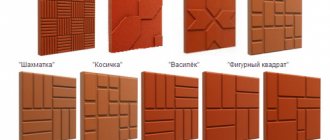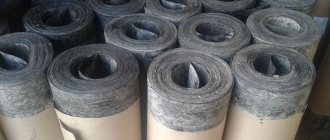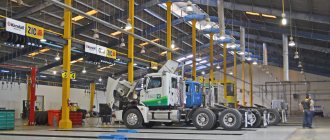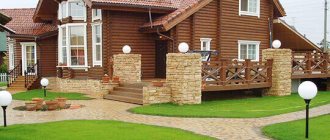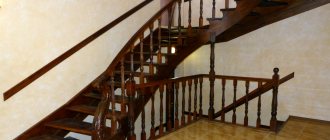Construction materials: stable demand for high quality
The production of building materials as a business is virtually doomed to success. Of course, provided that the manufacturer approaches its organization competently and ensures consistently high quality of all its products. At the same time, as a rule, it is not necessary to have an impressive initial capital: many entrepreneurs start with 20-30 thousand rubles.
The demand for building materials is always quite high: people are constantly building and renovating apartments, houses, and dachas. They look for a variety of materials, compare prices, study reviews on the Internet and listen to the advice of friends. Therefore, even a small business with a small staff, if desired, will ensure a constant flow of customers.
Business profitability
This type of business is highly profitable.
But at the same time it requires large capital investments. The cost of one production line can reach several million rubles. In addition, the enterprise needs to rent premises with an area of 100–300 square meters. meters. You will also need warehouses for raw materials and finished products. Don’t forget about additional expenses – workers’ salaries, electricity, transportation, etc. If you are ready to invest large start-up capital into your business, the money will return in 2-3 years, and the enterprise will generate a stable high income.
Who is this business suitable for?
There are a huge number of options regarding what kind of building materials to produce. Therefore, the list of those who are suitable for a business in building materials is very wide - in fact, there are no age, gender, national or any other restrictions. Even the division between rich and poor is not as fundamental as in other industries.
It can be noted that an indisputable advantage will be specialized education (secondary or higher), as well as experience in construction. A professional understands exactly what characteristics each material should have, what it is used for, and in what batches it needs to be produced and supplied.
The demand for building materials is always quite high: people are constantly building and renovating apartments, houses, and dachas
Polymer-sand tiles
Externally, polymer-sand tiles resemble ordinary ceramic tiles, but in terms of performance characteristics it is a qualitatively different roofing material, the main advantages of which include:
- Light weight (half the weight of cement analogues);
- Service life is about 100–150 years;
- Durability (does not break during transportation and installation).
When registering an enterprise, you need to carefully consider the choice of OKVED codes for the production of building materials: manufacturers of ordinary tiles indicate 23.32 “Production of building products from baked clay,” while in this case the activity involves the use of code 22.23 “Production of plastic products used in construction.” The raw materials for the production of tiles are polymer waste (polyethylene, PET, polystyrene, polypropylene), sand and dyes. A set of machines for their processing with a capacity of 100 m² per day can be purchased for 800 thousand rubles. This production line includes:
- Impact crusher;
- Universal mixer;
- Sand dryer;
- Melting and heating unit;
- Hydraulic press with molds.
Taking into account the cost per square meter of tiles (70 rubles) and the market price (250–300 rubles), the entrepreneur’s income will be at least 15 thousand rubles per day, and the payback period for investments will be about one and a half months.
Types of business in building materials
There is a huge variety of building materials on the modern market, and every couple of months either completely new products or improved old ones appear. What exactly is profitable to produce? We tell you the most promising business ideas in the field of building materials, depending on the size of the initial capital.
Up to 100 thousand rubles
Even if an entrepreneur has very modest funds in the range of 100 thousand rubles, he can invest in the profitable production of building materials and literally in 4-6 months not only recoup the funds spent, but also double them 2-3 times. Among the main directions are:
- Production of a variety of interior tiles: paving, ceramic, tiled, glass, luminous.
- Rubber processing and production of seamless rubber coatings (on site).
- Production of artificial stone, including liquid. As an option, covering the products with liquid stone.
- Manufacturing of wall blocks.
Up to 500 thousand rubles
This is the most extensive category with the predominant number of options. This includes a variety of finishing and roofing materials, as well as “budget” basic ones:
- Production of curb stones.
- Production of artificial marble.
- Manufacturing of different types of fasteners.
- Processing of automobile rubber, production of rubber tiles.
- Making Lego bricks.
- Production of composite reinforcement.
- Production of crushed stone, including colored, and decorative chips.
- Production of sandwich panels.
- Production of roofing felt.
- Production of polystyrene foam.
- Production of plasterboard.
- Business on expanded clay blocks.
- Brick production.
The list of those who are suitable for a building materials business is very wide - in fact, there are no age, gender, national or any other restrictions
Up to 1 million rubles
- Production of SIP panels.
- Manufacturing of tiles.
- Production of dry construction mixtures.
- Galvanized profiled sheets.
Over 1 million rubles
If an entrepreneur has more than 1 million rubles at his disposal, he may think about larger-scale enterprises that produce expensive and in-demand products:
- Production of particle boards.
- Production of hyperpressed bricks.
- Production of corrugated sheets and metal tiles.
- Asphalt production.
Of course, in each region of the country, prices may differ and, accordingly, businessmen will have to spend different amounts on organizing their business. But nowadays it is not difficult to compare prices and order equipment or raw materials from a neighboring city.
When calculating the amounts for creating a particular production, we took only costs associated directly with the business: equipment and the first batches of raw materials. That is, excluding rent, utility bills and other expenses.
Business with investments from a million rubles
The horizons of activity expand noticeably if there is an amount of 1 million rubles or more. Production of bricks, stones, blocks increases productivity and reduces costs using automated lines. This increases the initial costs by 2-3 times, but increases profitability by at least 20%.
You can open an enterprise for the production of scarce building materials that are in demand:
- Metal siding and corrugated sheeting;
- Reinforcing welded mesh;
- Wood-polymer composite and products made from it;
- Foam and gas blocks;
- Hardware (screws, nails).
Detailed descriptions of technologies, calculations of investments, profitability, payback periods are provided on business portals. The implementation of ideas brings 70-85% profit, investments pay off within no more than 2 years.
Algorithm for creating your own business for the production of building materials
First of all, a new entrepreneur needs to draw up a business plan. Of course, you can find a ready-made one on the Internet, but most likely it will not meet specific conditions. Therefore, you need to plan the development of the enterprise yourself.
To create your own production, in any case, you will have to go through the following steps:
- determine the amount of initial capital;
- determine the industry in which the company will start operating;
- make a list of initial expenses;
- rent premises;
- select and purchase equipment;
- form a staff;
- organize the technological process, including the supply of raw materials;
- sell the first batches of products.
There is a huge variety of building materials on the modern market, and every couple of months either completely new products or improved old ones appear.
Recruitment
To implement business ideas for the production of building materials, attracting labor is not necessary. The approach works when organizing low-profit handicraft industries with simple technological cycles.
Materials must comply with GOST, SNiP and similar regulatory documents. To organize the production of wholesale batches of products, specialist technologists, mechanics, and power engineers will be required. Staff salaries and accruals are taken into account when drawing up business plans and calculating the costs of organizing an enterprise and estimating current expenses.
How to buy equipment for an enterprise: useful recommendations
Whatever industry you choose, the success of your business will largely depend on the quality of the equipment you choose. Currently, there are almost no problems finding everything suitable - the market is overflowing with a variety of options. However, this circumstance creates the main difficulty: how to choose among a very wide range and buy only everything you need.
To select quality equipment for your business, follow these guidelines. Firstly, if possible, consult with specialists or visit a similar production facility - evaluate what kind of equipment is there and how the production process is structured.
Secondly, it is useful to study the offers of ready-made lines or equipment workshops. Many manufacturing companies offer immediate supply of all necessary equipment for all types of enterprises. This is very convenient, as it allows you to save on delivery (you don’t need to pay suppliers for each individual device), and if any equipment breaks down, the supplier will be able to quickly replace it.
Third, be wary of Chinese manufacturers. Among them there are both very reliable companies and very unreliable ones.
Before purchasing, read reviews and talk to manufacturers of building materials that work with such equipment. Failure to comply with this recommendation may result in serious losses.
Why construction business is profitable
The construction business is one of the areas that is in demand in any economic situation. Building materials are needed not only for building houses, but also for repairing and making furniture or DIY crafts. Other construction organizations also use the services of material suppliers.
Not all people know how to make repairs or make furniture. It is easier and more convenient for them to turn to professionals. This is ideal soil for starting a small business in the construction industry - a small company or private services.
Certification in the production of building materials
Also, when planning a building materials enterprise, it is important to take into account that certain categories of products in the Russian Federation are subject to mandatory certification. In this way, the state regulates the quality of goods on the market and even ensures the safety of citizens by protecting them from low-quality materials.
To form a holistic picture of such products, you need to read the “Unified List of Products Subject to Mandatory Certification” . The current and regularly updated version is available online in the Consultant system.
Whatever industry you choose, the success of your business will largely depend on the quality of the equipment you choose
Manufacturers of construction products first of all need to remember that it includes cement and certain types of tiles. To be sure that all requirements are met, the entrepreneur is recommended to study the list independently.
Company organizational plan
The implementation of the project begins with the legalization of activities. The next stages of work are searching and arranging premises, purchasing equipment, concluding contracts with suppliers of raw materials and hiring workers.
Enterprise registration
To be able to sell finished products wholesale to legal entities, you will have to open an LLC with one or several founders. Documents needed:
- originals and copies of passports of all LLC members;
- memorandum of association;
- application for registration of a legal entity;
- cash orders confirming the formation of the authorized capital.
Product certification
There is no mandatory requirement to obtain certificates confirming the quality of dry mixtures. They are issued at will or a refusal letter is written. Based on this document, the company’s products will be recognized as complying with established standards. However, entrepreneurs who plan to develop production and wish to take part in tenders certify their products. This gives them more options.
Production room
The process of making dry mixtures is simple, but requires certain conditions. The choice of premises for a workshop should be taken seriously. The ceiling height should exceed 7 m, and the recommended area is 80–120 m2 for the production area plus 50 m2 for the warehouse.
Attention! The room must be heated. It is unacceptable for the temperature in the workshop to drop below +16 degrees in winter.
Equipment
The cost of equipment varies between 1.6–3.2 million rubles and depends on production capacity, configuration and functionality. It is better to purchase it as a kit, which by default includes the following units:
- mixer;
- screw;
- dryer;
- vibrating sieve;
- lift;
- dispenser;
- packing bin.
In addition, you will have to buy scales, wooden pallets and small tools and equipment.
Medium-power equipment is capable of producing 4–5 tons of dry mixture per hour. If you plan to produce larger batches of products, buy a more powerful production line – 8–10 t/hour. It is important to clarify all the nuances regarding the automation of the process of producing mixtures. Some machines operate in semi-automatic mode at certain stages of work, while other units perform all functions with virtually no human intervention. This also affects the cost of production capacity.
Search for suppliers of raw materials
The business plan for the production of dry construction mixtures includes the cost of purchasing raw materials. In Russia there are suppliers of sand and cement, hydrated lime. Expensive modifying additives will have to be purchased in Europe. To produce putty, tile adhesive, and plaster, you will need the following ingredients:
- Portland cement (gray and white);
- calcium carbonate;
- sand;
- hydrated lime;
- additives.
Attention! When purchasing raw materials, you must ask for certificates for each batch of goods.
Formation of staff
At the initial stage of work, you need to hire several workers for the following positions:
- technologist;
- dosing and mixing unit worker;
- 2–3 people to service the production line;
- packer;
- loader.
Enterprise management falls on the shoulders of the business project organizer, and accounting can be outsourced.
How to compete among a huge number of manufacturers
The main disadvantage of such a business is very high competition. Some economists even argue that the supply of building materials has been exceeding demand for several years. Perhaps in some individual areas this is the case, but in general this is not the case.
A manufacturer of truly high-quality products can always find buyers. Another question is that few people manage to effectively combine high-quality production with good marketing. Advertising and promotion are very important, especially in the first stages of work when the company has no clients and no one can write good reviews about it.
The most effective types of advertising for building materials are outdoor (on special structures on city streets) and contextual on the Internet (ads are shown to users searching the Internet for information about construction and specific materials).
Brick production
This building material has been and will always be in demand. People build houses, cottages, industrial premises. This activity is very profitable, but very expensive and requires long-term promotion. There are enough competitors in this market, but the good news is that construction has been developing very rapidly lately, housing has become in demand, people want to have an apartment, a house, and a dacha.
You need to start making bricks by finding premises. It should not be less than 500 sq. m. Ceiling height – at least 5 meters. This area houses a full-fledged production line. Renting such premises may not be very expensive, because you will be happy with suburban areas, even those not equipped with various amenities, the only necessary condition is the presence of a sewerage system. The premises are divided into three zones: a production workshop, a raw material warehouse and a finished brick warehouse.
Decide how you will produce the brick. Sand-lime brick is produced by plastic molding; it will be profitable only when your capacity exceeds 30 million bricks. The second method is hyperpressing. Its profitability becomes positive already at 2 million units. The third method is the standard one, using firing, the profit will come from 400 bricks. Experts say that one-time investments in organizing the process require in the first case - 100 million rubles, in the second - 10 million, and in the third case - 2 million rubles.
It is best to purchase equipment in the region where you live, so that in the event of a breakdown, you can quickly bring a specialist and provide warranty service. After you rent a room, buy and install equipment, hire workers and complete all documents (including permits), you can start working. And don’t forget about drawing up a competent business plan; add this line to your initial expenses. It's better to spend the money, but then you get a well-planned guide to action that will be much easier to work with. The full payback of such a plant should occur within a period of 1 to 3 years.
E. Shchugoreva
0
Author of the publication
offline 8 years
Elena Shchugoreva
0
Comments: 0Publications: 208Registration: 02-03-2013
Advantages and risks of the construction business
Like any other building materials business, it has advantages and disadvantages. Of course, they will largely depend on the chosen specialization, but we can also identify some general trends that are characteristic of the entire wide range of manufacturing building materials.
Advantages of a building materials business
- Consistently high demand both among private buyers and among developers.
- You can start a business even with very modest capital, and when you reach a net profit, you can expand production or develop new directions.
- A very wide range of opportunities for self-realization of an entrepreneur as a manufacturer, manager, technologist or marketer.
- You can save on rent: premises and workshops in industrial areas of the city can be rented quite inexpensively.
Disadvantages of entrepreneurship in building materials
- High competition. The beginning manufacturer will compete with large hypermarkets, construction depots and other similar small firms.
- Certain types of production require certification.
- To create a consistently competitive enterprise, you will have to invest a lot of money in the purchase of equipment and debugging of the technological process (albeit gradually).
Subsequent development of the case
If any type of construction business is properly organized, it pays off in the shortest possible time. The main advantages of developing a business in this industry:
- constantly high demand;
- you can start a business even with a small capital, it is important for its development to then expand;
- a wide range of opportunities allows an entrepreneur to develop as a marketer, technologist and competent leader.
It is important to constantly monitor the quality of products and expand production itself. It is also necessary to introduce new technologies that will help reduce the cost of production without losing quality.
Despite high competition, demand in the building materials market does not exceed supply, and therefore opening production in this industry still remains a profitable business. It is important to correctly grasp the subtleties of the process and create a high-quality business plan that can interest investors. We recommend looking at existing manufacturers of building materials and conducting competitive intelligence.
10.03.2020


